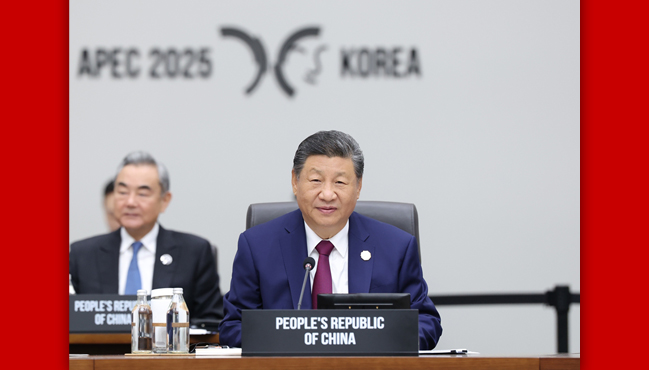
站内搜索
|
The Third Period: Eight-Point Proposal for Developing Cross-Straits Relations and Promoting the Peaceful Reunification of the Motherland Jiang Zemin’s speech titled “Continue to Promote the Reunification of the Motherland” brilliantly elaborated the essence of Deng Xiaoping’s thoughts on “peaceful reunification” and “one country, two systems,” and put forward an eight-point proposal for developing cross-Straits relations and promoting China’s peaceful reunification under the present circumstances.
1. Background to the Eight-Point Proposal In June 1989, the Fourth Plenary Session of the Thirteenth CPC Central Committee led to a new Party Central Committee with Jiang Zemin at its core. For the new collective leadership of the Central Committee, the question of how they should bring about China’s reunification was a major issue that concerned spectators both at home and abroad. On September 29, at the celebration of the 40th anniversary of the founding of the People’s Republic, Jiang Zemin solemnly declared, “Following the Third Plenary Session of the Eleventh CPC Central Committee, we set forth the guiding principle of peaceful reunification of the motherland and the idea of ‘one country, two systems.’ These are our fundamental policies.” In October 1992, in his report at the Fourteenth National Congress of the CPC, Jiang Zemin formally classified the scientific notion proposed by Deng Xiaoping of “one country, two systems” as one of the main points of Deng Xiaoping’s theory on building socialism with Chinese characteristics. This was an important event of great historical, theoretical and practical significance. Guided by the fundamental principals established by the CPC and Chinese government of “peaceful reunification” and “one country, two systems,” and through the concerted efforts of compatriots on both sides of the Straits, at the end of 1987, the protracted thirty-eight-year state of isolation between compatriots on both sides was broken and cross-Straits contact constantly expanded; scientific, cultural, academic and sporting exchanges vigorously developed; investment in the mainland by Taiwan businesses and indirect cross-Straits trade increased dramatically; cross-Straits economic relations gradually intensified; and a complementary and mutually beneficial situation began to take shape. Since 1992, the Association for Relations Across the Taiwan Straits and Straits Exchange Foundation have carried out consultations on specific issues on the basis of the one-China policy. In April 1993, the famous Wang-Koo talks were held between Wang Daohan and Koo Chen-fu, which marked a historic step in the development of cross-Straits relations. During the same period, major changes took place in the international and Taiwan situations. Internationally, radical changes took place in Eastern Europe in 1989 and the Soviet Union fell in 1991, which meant the US became the world’s sole superpower. The US intensified its use of the Taiwan issue to divide and Westernize China. After this, Lee Teng-hui gradually turned his back on the one-China policy and obstinately refused to peacefully negotiate reunification in an attempt to turn Taiwan into an independent political entity under the name “Republic of China,” and publicly announced the notions of “two Chinas” and “one China, one Taiwan.” Supporting and conniving with Taiwan independence forces and their activities has developed such forces and caused the idea of Taiwan independence to spread. It was against the backdrop of these events that Jiang Zemin, as a representative of the CPC and Chinese government, delivered the important speech “Continue to Promote the Reunification of the Motherland” on January 30, 1995.
2. Basic Content of the Eight-Point Proposal (1) Adhering to the one-Chine principle is the basis and prerequisite for peaceful reunification and for firmly opposing all forms of Taiwan independence and separatist behavior. (2) We have no objection to Taiwan developing nongovernmental economic and cultural relations with other countries, but we oppose any efforts by Taiwan to expand its international living space with the purpose of creating “two Chinas” or “one China, one Taiwan.” (3) With regard to carrying out cross-Straits negotiations on peaceful reunification, representatives of all parties and organizations on both sides of the Straits may participate in the negotiations. Assuming the premise that there is only one China, we are prepared to discuss any matter. Cross-Straits negotiations on peaceful reunification can be carried out step-by-step, with the first step involving negotiations on “formally ending the state of hostilities across the Straits under the one-China principles.” (4) We should make every effort to achieve peaceful reunification, but we do not promise to renounce the use of force. (5) In the face of world economic development in the 21st century, great efforts should be made to expand cross-Straits economic exchanges and cooperation and accelerate the implementation of the three direct links across the Straits to benefit the common economic prosperity of both sides and the wellbeing of the Chinese nation as a whole. (6) Compatriots on both sides of the Straits should draw upon and carry forward China’s fine cultural traditions. (7) We should fully respect the lifestyle of our Taiwan compatriots and their wish to be masters of the country, and protect all their legitimate rights and interests. We welcome all political parties and individuals from all sectors of Taiwan society to exchange views with us on cross-Straits relations and peaceful reunification, and welcome them to visit the mainland. (8) We welcome the leader of the Taiwan authorities to visit the mainland in an appropriate capacity. We are also willing to visit Taiwan at their invitation.
After Jiang Zemin delivered his speech, it produced a strong reaction in Taiwan, Hong Kong and Macau, and among overseas Chinese and the international community. Foreign and domestic public opinion held that this was another programmatic document systematically expounding the CPC and Chinese government’s policy on Taiwan following on from Ye Jianying’s nine principles and policies for Taiwan to return to the motherland and achieve peaceful reunification, as proposed in his “Message to Our Taiwan Compatriots,” and Deng Xiaoping’s six-point vision for achieving the peaceful reunification of Taiwan and the mainland. 3. Significance of the Eight-Point Proposal Jiang Zemin’s speech detailed further the guiding principles of “peaceful reunification” and “one country, two systems,” the significance of which is as follows: First, it stresses that the one-China principle is the cornerstone of the policy on Taiwan. In response to Lee Teng-hui turning his back on the one-China principle and intensifying separatist activities since the 1990s, it was made absolutely clear in the first of the eight proposals that “Adhering to the one-China principle is the basis and prerequisite for peaceful reunification. We absolutely will not permit Chinese sovereignty and territory to be divided.” This forms the core of the eight-point proposal. “Any words or deeds fomenting Taiwan independence should be firmly opposed, and any proposals contrary to the one-China principle, such as “splitting the country and ruling separately” and “having two Chinas for a certain period of time,” should also be firmly opposed.” Although the two sides of the Taiwan Straits have not been unified, Taiwan’s status as part of Chinese territory has never changed; therefore, China’s sovereignty over Taiwan has also never changed. Second, the proposal to carry out cross-Strait negotiations step-by-step enriches and develops the content of negotiations on peaceful reunification. Deng Xiaoping’s basic proposal for cross-Straits peace talks was to hold negotiations between the KMT and CPC on an equal basis, not between “two Chinas” or between central and local governments. The eight-point proposal raised the idea of cross-Straits negotiations for peaceful reunification for the first time in response to changes in the Taiwan situation. It emphasized that, assuming the premise that there is only one China, any issue could be discussed, including issues of concern to the Taiwan side. Jiang Zemin innovatively proposed that the political negotiations be carried out step-by-step in order to reach accord on matters. This provided a basis for apportioning responsibility for safeguarding China’s sovereignty and territorial integrity and working together to draw up a plan for the future development of cross-Straits relations. Third, it clarifies the point that China would not rule out the use of force. Jiang Zemin stressed that the Chinese government will work make every effort to achieve peaceful reunification, and that Chinese people should not fight each other. But he also clearly pointed out that in not ruling out the use of force, it did not mean Taiwan compatriots would be the target, but rather foreign forces conspiring to interfere in China’s peaceful reunification and bring about Taiwan independence would be the target. Fourth, it states that political differences should not influence or interfere with cross-Straits economic cooperation. Jiang Zemin said that in the face of world economic development in the 21st century, great efforts should be made to expand cross-Straits economic exchanges and cooperation, and no matter what happens, the legitimate rights and interests of Taiwan businesspeople should be protected. The splendid culture created by the sons and daughters of all China’s ethnic groups over the past 5,000 years is a lasting spiritual bond linking all Chinese people, as well as an important basis for peaceful reunification. Compatriots on both sides of the Straits should draw upon and carry forward China’s fine cultural traditions. Fifth, it expresses greater understanding, respect and hope for the honest attitude of the Taiwan people. Jiang Zemin pointed out that the 21 million Taiwan compatriots are all Chinese connected by familial ties, regardless of whether they are native to Taiwan or come from other provinces, and that we should fully respect the lifestyle of our Taiwan compatriots and their wish to be masters of the country, should strengthen relations with our Taiwan compatriots, listen to their opinions and requests, and protect all their legitimate rights and interests. Sixth, it points out that resolution of the Taiwan issue cannot be delayed indefinitely. Jiang Zemin stated that completing the reunification of the motherland as soon as possible is the common aspiration of the people of all China’s ethnic groups. In 1997 and 1999 we resumed sovereignty over Hong Kong and Macau respectively, which was a happy occasion for all Chinese people, including Taiwan compatriots. Now is the time to accomplish the great undertaking of reunification of the motherland and to achieve complete rejuvenation. Indefinitely delaying reunification is something no patriotic compatriot wishes to see. The extraordinary course cross-Straits relations have taken since “Continue to Promote the Reunification of the Motherland” was published shows the important role the eight-point proposal played in their development and the far-reaching impact it will have in promoting the development of cross-Straits relations and in the reunification process.(To be continued) |
相关新闻
中国日报英文版两岸频道 | 中国日报中文版两岸频道 | 湖南中国和平统一促进会 | 广西中国和平统一促进会 | 江西中国和平统一促进会 | 中国政府网 | 中共中央统一战线工作部 | 国务院台湾事务办公室 | 外交部 | 人民政协网 | 黄埔军校同学会 | 全国台联 | 中国侨联 | 台盟 | 新华网 | 人民网 | 中新网 | 中央电视台 | 中央人民广播电台 | 国际在线 |

地址(ADD):北京市丰台区南三环中路赵公口小区20号
邮编(PostCode):100075 电话(TEl):86-10-58336312
京ICP备19039447号-1 中国和平统一促进会版权所有
 请关注微信公众号
请关注微信公众号





